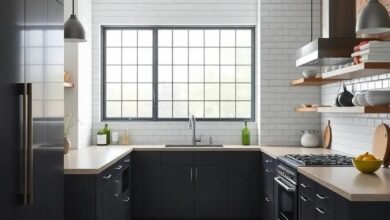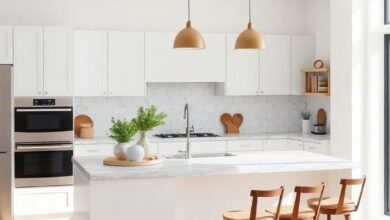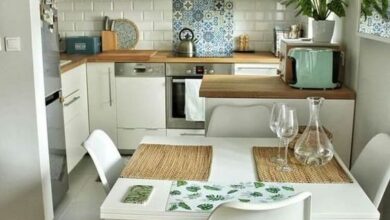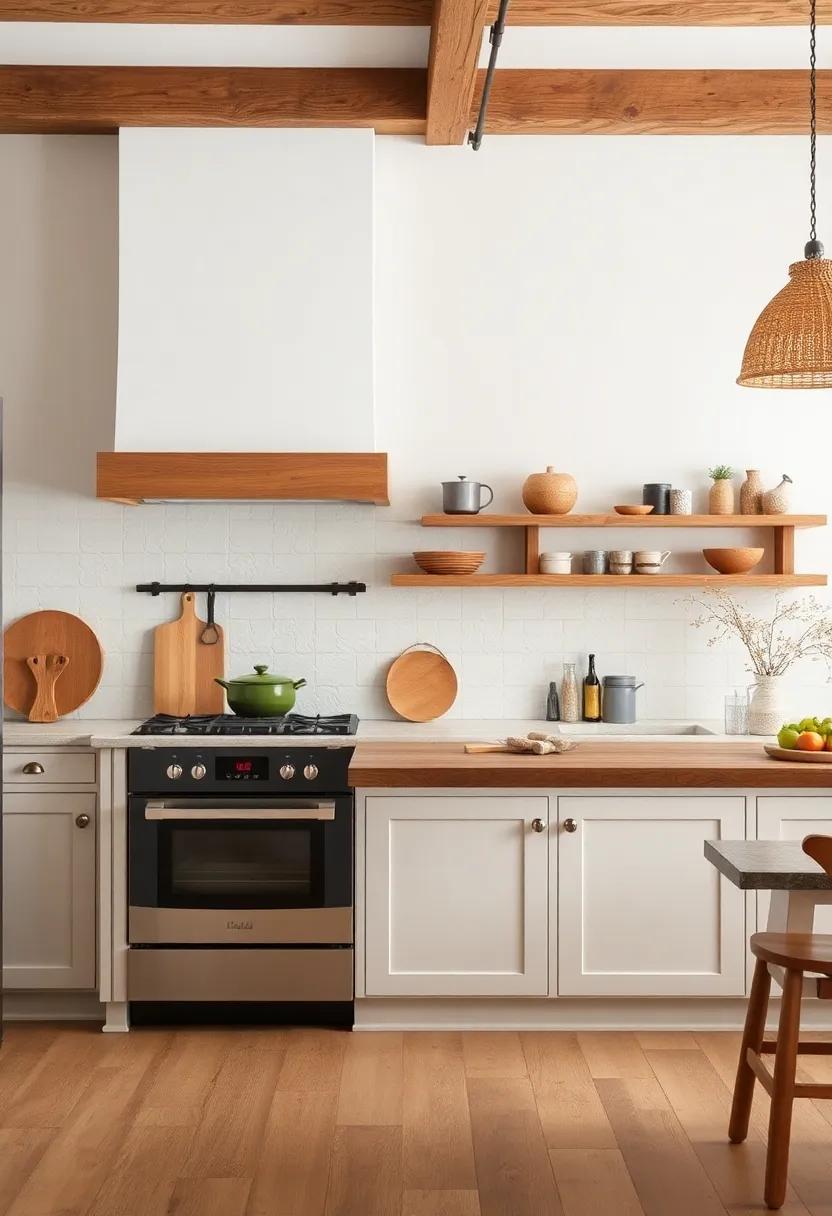
Embracing Warmth and Charm: The Allure of Rustic Kitchen Designs
In a world where sleek lines and minimalism frequently enough dominate the landscape of modern design, a growing number of homeowners are turning to the comforting embrace of rustic kitchen aesthetics.The allure of rustic kitchen designs lies in their ability to blend warmth and charm, evoking a sense of nostalgia while embracing the beauty of imperfection. Imagine stepping into a space where weathered wood beams and artisanal finishes tell stories of years gone by, and where every meal prepared evokes a sense of connection to the earth and one another. as we explore the myriad elements that define this enchanting design style, we’ll uncover how rustic kitchens not only serve as functional cooking spaces but also as heartwarming hubs for family gatherings, culinary creativity, and cherished memories. Join us on this journey into the world of rustic charm,where each detail beckons you to slow down,savor,and embrace the simple pleasures of home.
Embracing Natural Materials for a Cozy Rustic Kitchen Environment
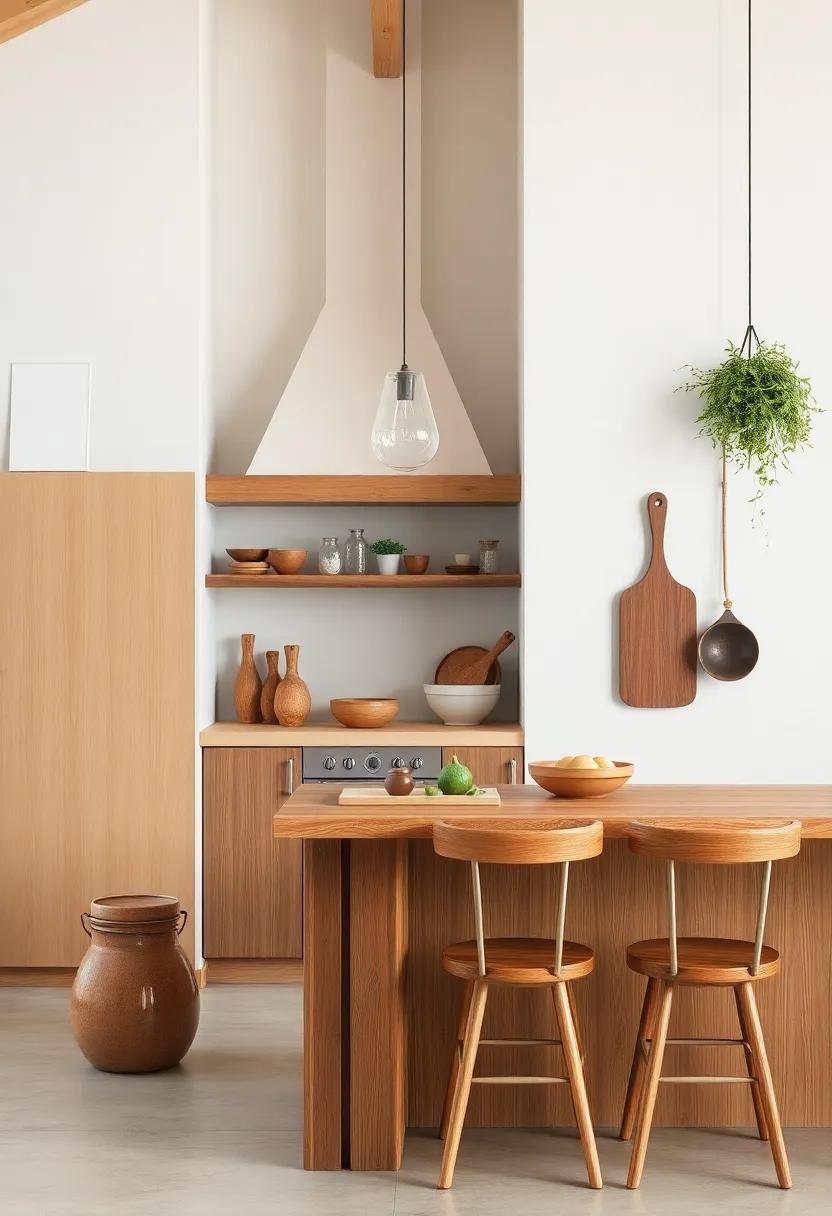
To create a truly inviting rustic kitchen, incorporating natural materials is essential. Wood, stone, and metal each bring their own unique warmth and texture, making the space feel connected to nature. Such as, exposed beams and reclaimed wooden cabinets enhance the organic feel, while a stone backsplash or granite countertop adds durability and charm. Consider these elements for your kitchen renovation:
- Reclaimed Wood: Utilize for cabinets, shelving, or a kitchen island to add character.
- Natural Stone: Opt for granite or slate for countertops and flooring.
- Wrought Iron Accents: Use for light fixtures and hardware to emphasize rustic elegance.
When selecting natural materials, keep in mind their color palette and interaction with light. Warm, earthy tones can evoke a sense of comfort, while textures like rough-hewn wood or smooth stone introduce visual interest. Mixing different materials can also create balance and highlight personal style. Such as, pairing a wooden table with metal chairs reflects a blend of warmth and industrial design. Check out Houzz for inspiration and ideas that resonate with rustic aesthetics.
Choosing Timeless Colors that Reflect Rustic Elegance and Warmth
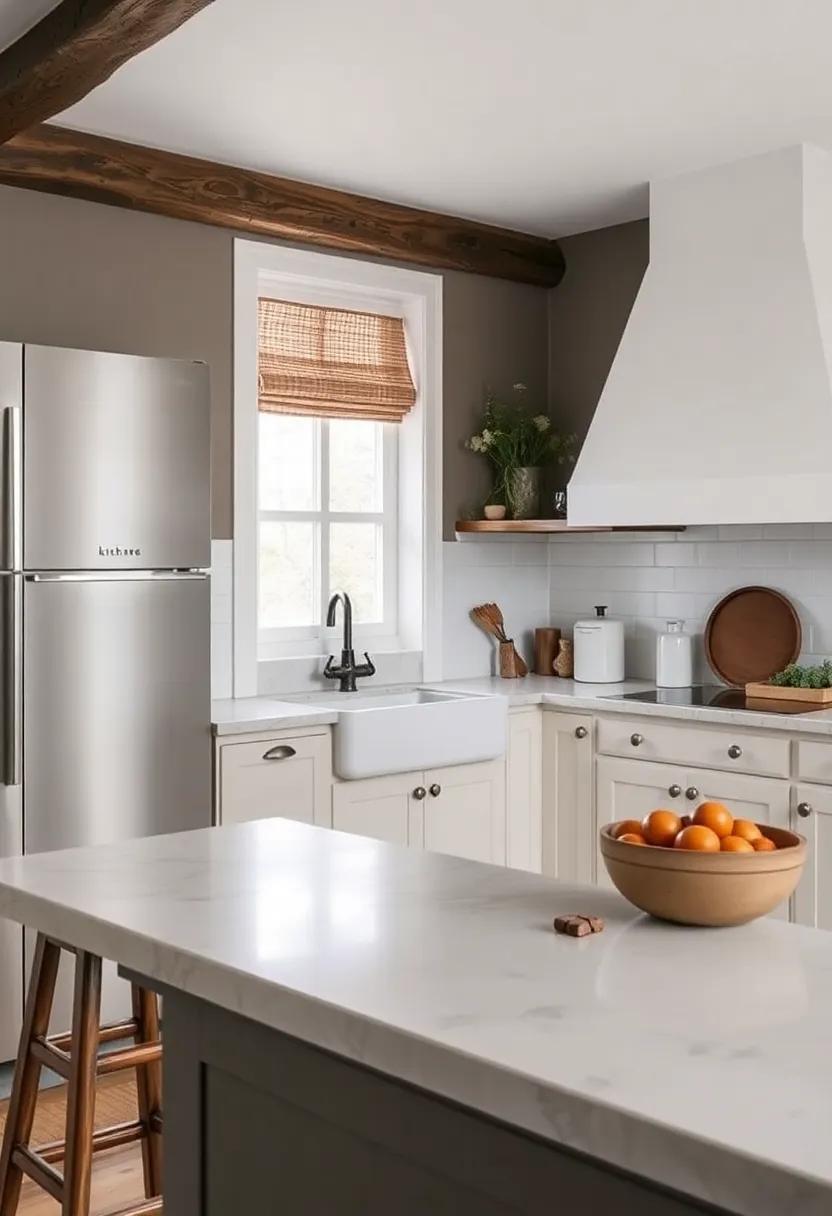
When designing a rustic kitchen, the choice of colors plays a pivotal role in evoking the warmth and charm that the style embodies. Opting for a palette that includes earthy hues can substantially enhance the overall aesthetic.Shades such as terra cotta, olive green, warm beige, and deep brown create a cozy atmosphere that makes the space feel inviting and homey. Accent colors like burnt orange or soft mustard can be used sparingly to add depth without overwhelming the room. These timeless colors resonate beautifully with natural wooden elements, ensuring that your kitchen remains stylish yet grounded in rustic elegance.
Incorporating these colors doesn’t mean you have to compromise on modern accents. You can blend traditional rustic tones with contemporary fixtures to achieve a harmonious balance. Consider using natural materials like stone or reclaimed wood alongside the chosen colors to reinforce the theme. When selecting cabinets or countertops,look for finishes that highlight the natural textures and colors inherent in the materials. Harmonizing rustic shades with modern designs allows for an appealing fusion that captures the essence of comfort and sophistication. For further inspiration, explore various design ideas on Houzz, where you can find stunning examples of rustic kitchens that reflect warmth and charm.
Incorporating Open Shelves to Showcase Rustic Charm and Functionality
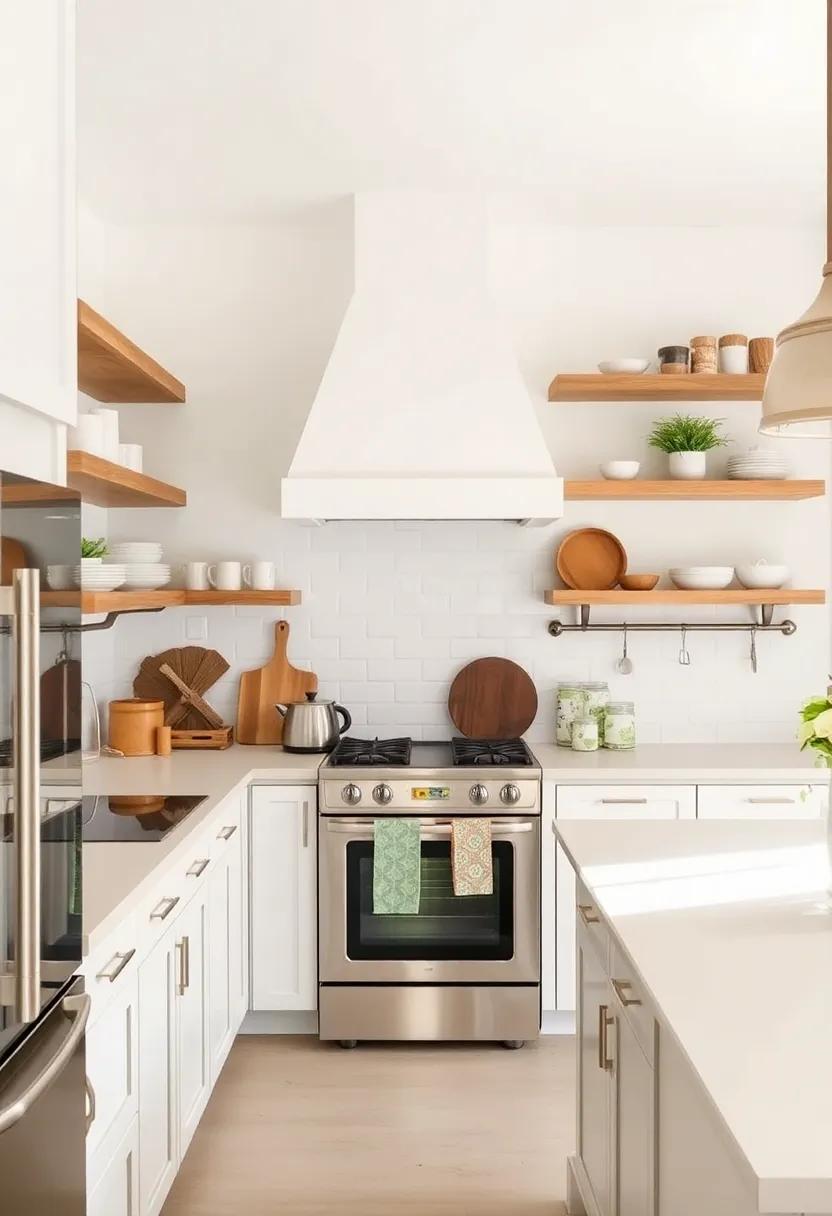
Open shelves can be a game-changer in your rustic kitchen,serving as both practical storage solutions and charming focal points. By using natural materials like reclaimed wood, you can create a warm and inviting atmosphere while showcasing your treasured kitchenware. Imagine displaying a collection of vintage dishes, handcrafted mugs, or beautifully arranged spice jars, which not only adds character but also encourages a sense of authenticity. To enhance the appeal, consider incorporating elements such as:
- Texture: Combine various materials like wicker baskets or metal containers to create visual interest.
- Lighting: Use pendant lights or fairy lights above the shelves to highlight your display.
- Color: Choose a harmonious palette that complements the earthy tones of the wood.
In addition, varying the heights and placements of your open shelves can add depth to the overall design. Strategically positioning larger items on lower shelves and lighter, smaller pieces on higher shelves helps maintain a balance. To ensure functionality, you could integrate a small table with designated space below, allowing space for cookbooks and additional kitchen tools that you frequently use. To inspire your creativity further,explore more ideas on Houzz where you’ll find an array of rustic kitchen designs to spark your imagination.
The Role of Vintage Appliances in Enhancing Rustic Kitchen Aesthetics
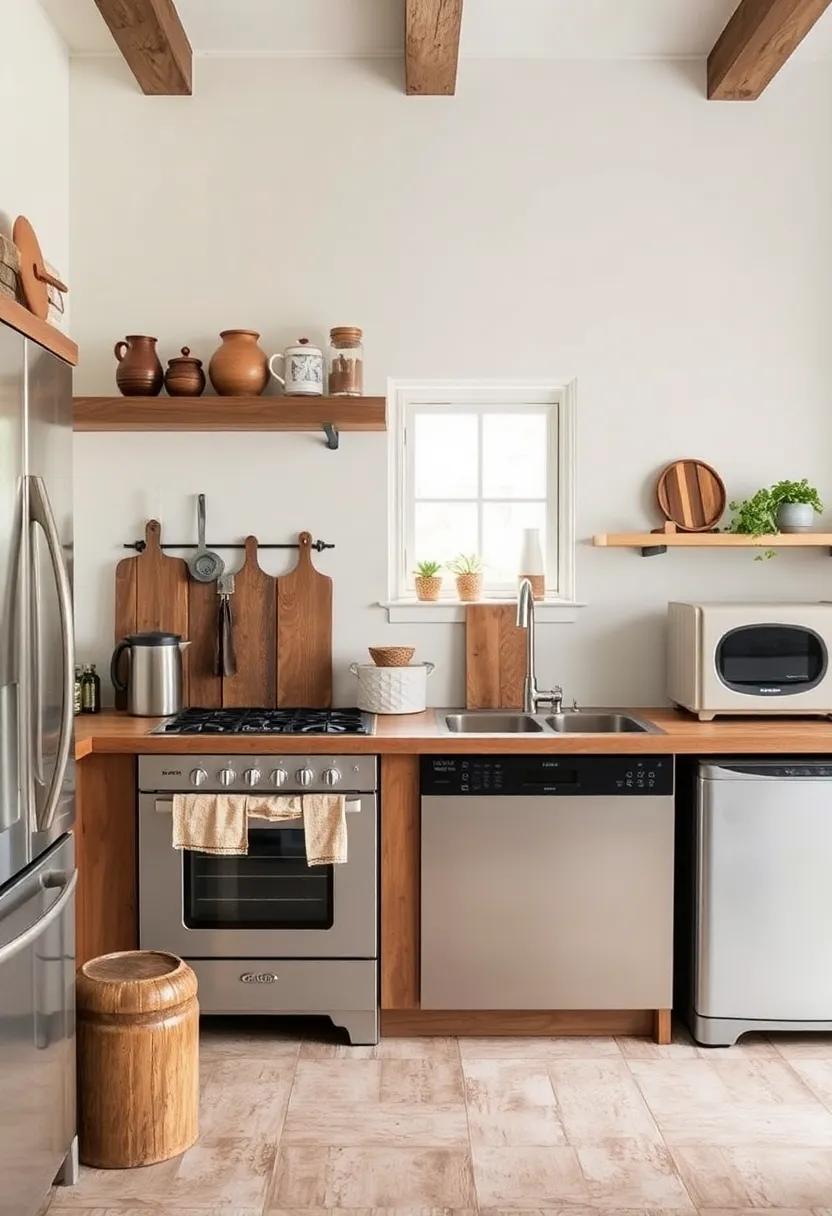
Incorporating vintage appliances into a rustic kitchen elevates the design by creating a stunning interplay between modern functionality and timeless charm. The unique character of these appliances can transform the cooking space into a focal point that echoes the warmth of country living. Whether it’s a classic cast-iron stove or a retro refrigerator, each piece contributes to an inviting atmosphere that feels both nostalgic and authentic. Here are some key points that highlight their importance:
- Character and Charm: Vintage appliances carry a story and add an element of history to your kitchen.
- Color and Texture: Many vintage pieces come in vibrant colors or unique finishes that can complement rustic wood and stone elements.
- Functionality: Older models often feature robust designs that prioritize durability, offering reliable performance through the years.
Moreover, these appliances can serve as conversation starters, drawing attention to their unique designs and craftsmanship. the combination of polished metals, muted pastels, and bold hues creates an eclectic yet cohesive look. Pairing them with rustic cabinetry and farmhouse sinks can further emphasize the kitchen’s charm and personality. Consider presenting these vintage treasures in a carefully curated way, such as:
| Appliance Type | impact on Design |
|---|---|
| Vintage Stove | Creates a nostalgic focal point with its retro design. |
| Retro Refrigerator | Adds a splash of color and personality to the space. |
| Classic Mixer | Combines utility with aesthetic appeal on countertop spaces. |
For those seeking inspiration on vintage kitchen styles, explore resources at apartmenttherapy.com.
Natural Light: Maximizing sunlight for a Bright Rustic Kitchen Ambiance
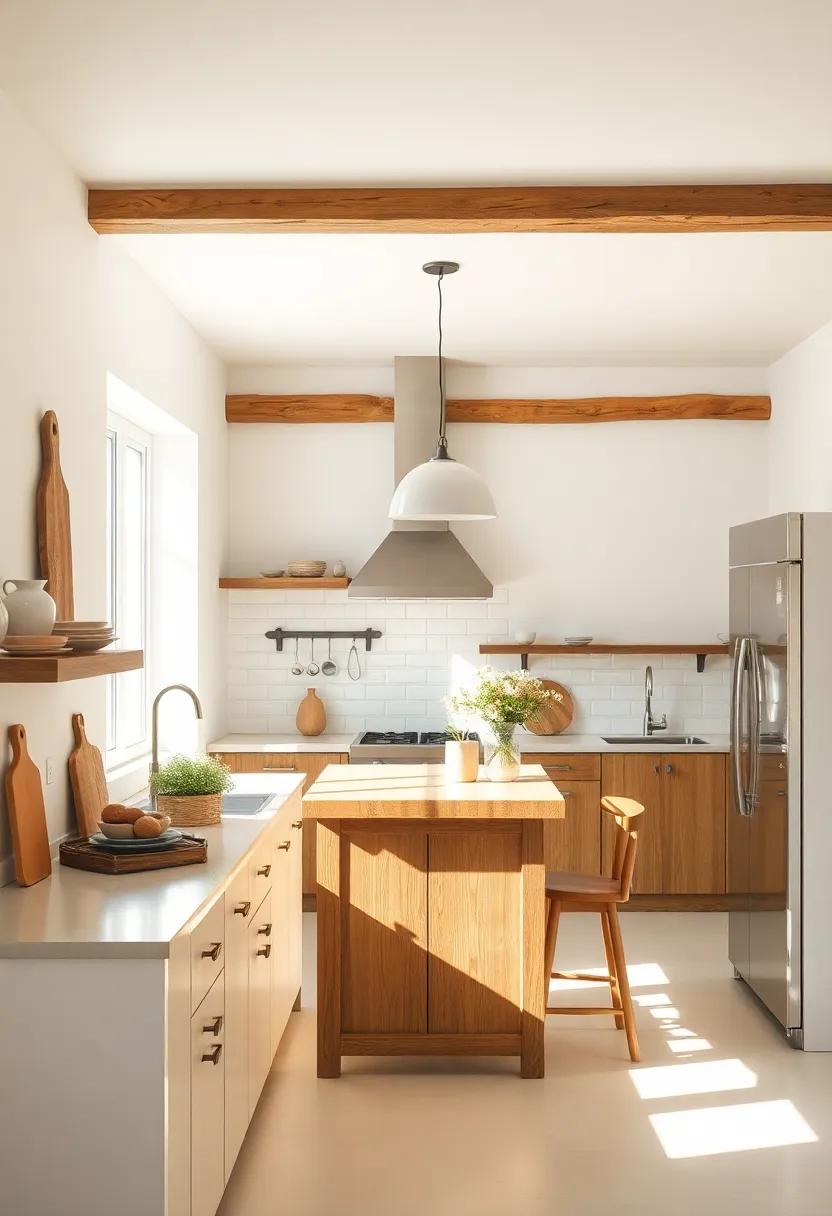
Natural light plays an essential role in crafting the enchanting atmosphere of a rustic kitchen. By strategically placing windows and utilizing open layouts, you can invite an abundance of soft, golden sunlight into the space, enhancing its natural warmth. Consider skylights or large farm-style windows that frame picturesque outdoor views, allowing the kitchen to feel like an extension of nature. To further maximize illumination, opt for light-colored wall finishes and natural wood accents that reflect sunlight, creating a cozy and inviting environment.
Incorporating elements that harmonize with natural light is also key to achieving that rustic charm. Choose translucent materials for window treatments, such as linen or sheer cotton, to diffuse the sunlight while still providing privacy. Accessories like hanging plants or herb gardens placed near windows not only enhance the visual appeal but also thrive in the sunlight. Additionally, consider a color palette that draws inspiration from the outdoors, featuring earthy tones and soft pastels that complement the daylight and accentuate the kitchen’s inviting ambiance. For more inspiration on enhancing natural light in your home, visit Houzz.
Creating a Inviting Focal Point with a Stunning Farmhouse Sink
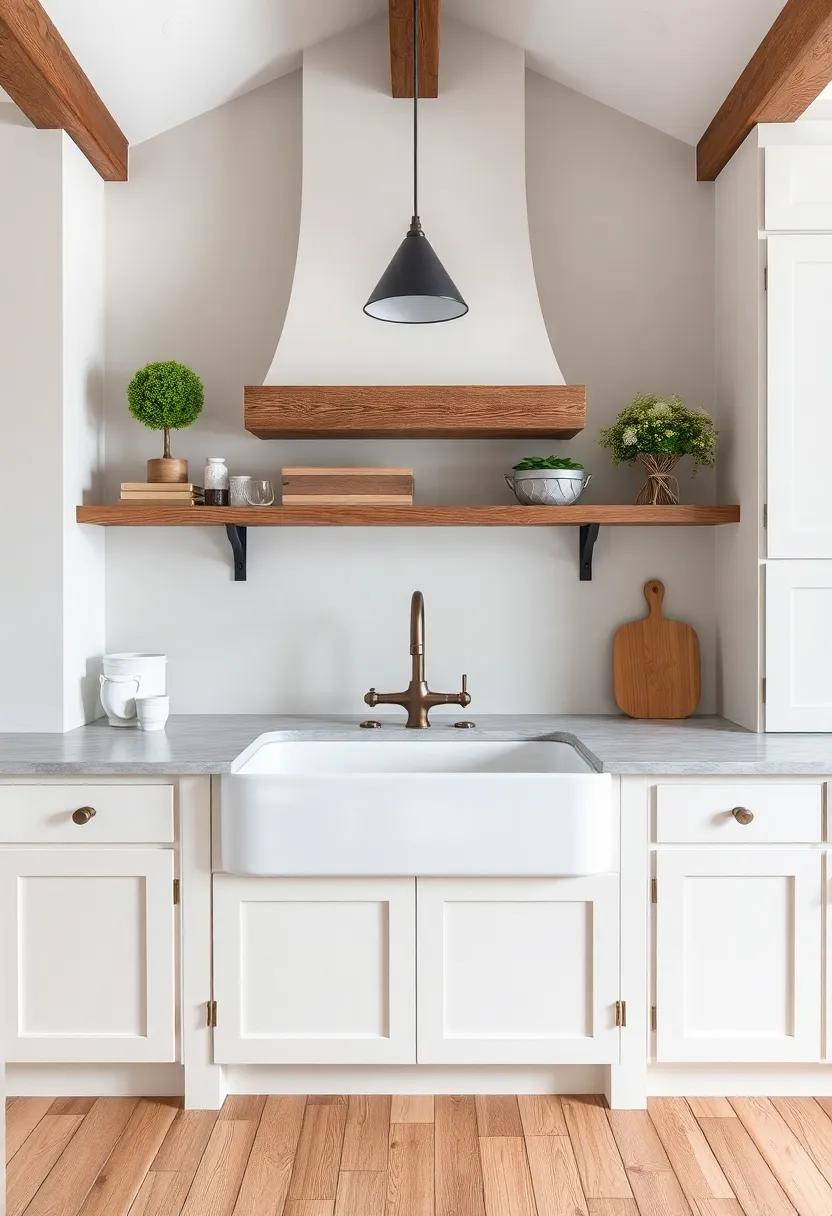
In the heart of every rustic kitchen lies a centerpiece that embodies the warmth of home, and there’s no better candidate than a carefully selected farmhouse sink. these sinks not only serve a practical function but also act as a visual anchor in the kitchen’s design. With their spacious basins and charming aesthetics,they effortlessly draw the eye while combining function and beauty. Homeowners can choose from a variety of materials, including ceramic, cast iron, or stainless steel, each bringing its unique character to the space. Complementing these sinks with vintage faucets or handmade soap dishes can further enhance their allure.
to create an inviting atmosphere around the farmhouse sink, consider the surrounding elements of your design. A butcher block countertop or shaker-style cabinets can provide that quintessential rustic feel. Accentuate the warmth with creative use of color—think muted earth tones or soft pastels that echo nature’s palette. Incorporate live plants or herbs in stylish pots nearby; they not only add a splash of color but also connect the kitchen to the outdoors. Here’s a simple table to summarize aesthetic choices:
| Element | Style | Color Suggestions |
|---|---|---|
| Farmhouse Sink | Traditional | White, Cream |
| Countertop | Natural Wood | oak, walnut |
| Cabinets | Shaker Style | Soft Grey, Sage Green |
Adding thoughtful details around your farmhouse sink encourages warmth and comfort, making it not just a workspace, but a welcoming gathering place for family and friends. For more inspiration on rustic kitchen designs, visit House Beautiful.
authentic Textures: Blending Wood, Stone, and Metal in Your Kitchen
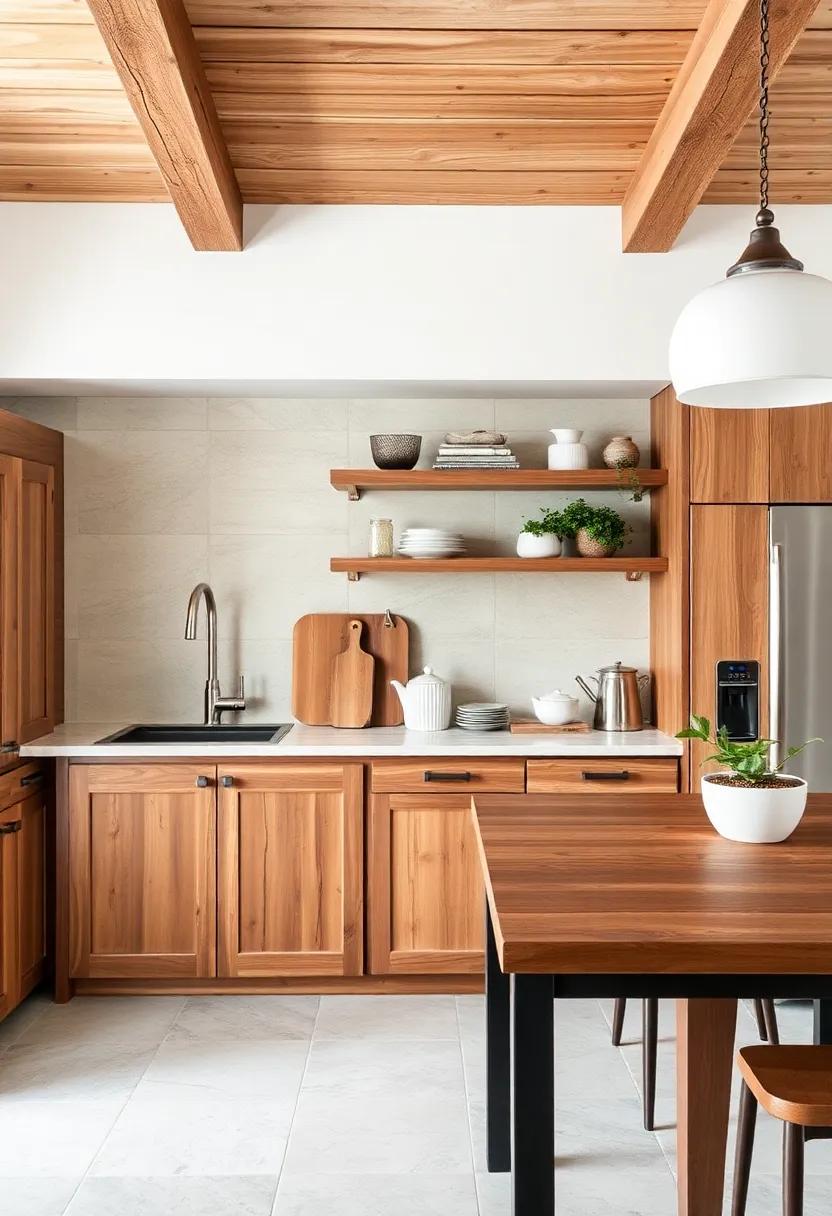
Incorporating an assortment of materials can elevate the aesthetic appeal of your kitchen while enhancing its functionality.the combination of wood, stone, and metal creates a dynamic visual contrast that resonates with a rustic charm. For cabinetry, consider using rich, hand-crafted wood that adds warmth, while the sturdy, earthy textures of stone can serve as a breathtaking countertop or backsplash. Pair these components with sleek metal accents—like brass or matte black fixtures—to achieve a balanced and inviting space. This amalgamation not only provides practicality, but also tells a story of nature’s bounty, beckoning an ambiance that feels organic and lived-in.
To further refine your kitchen’s design, pay attention to the details that unify these materials.For instance, choose a cohesive color palette that resonates with the natural tones of each element. Decorative features such as open shelving made from reclaimed wood can beautifully showcase stoneware, while metal frames can add an industrial touch to your rustic theme.Consider using pendant lighting with metal finishes to punctuate the design, pulling the eye upwards and creating a focal point. Here’s a simple overview of how different materials can harmonize in your kitchen:
| Material | Usage | Effect |
|---|---|---|
| Wood | Cabinetry and Shelving | Adds warmth and character |
| Stone | Countertops and Backsplashes | Offers durability and natural beauty |
| Metal | Faucets and Fixtures | Injects modern elegance |
Embracing these authentic textures can transform your kitchen into a harmonious retreat.Revisit resources like Architectural Digest for further inspiration on rustic designs that balance warmth with sophistication.
Rustic Lighting Fixtures that Illuminate and Enchant Your Space
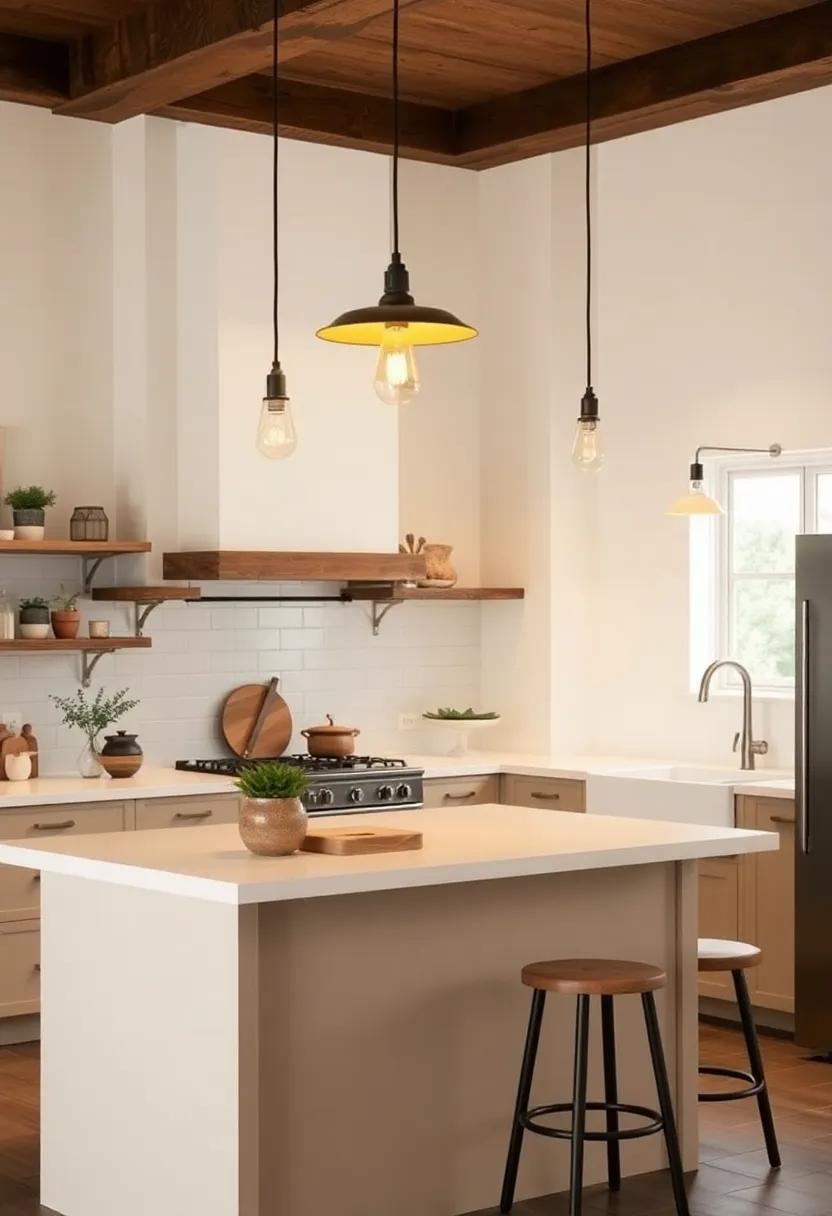
When it comes to creating an inviting atmosphere in a rustic kitchen, the choice of lighting fixtures plays a pivotal role. Embracing natural materials and organic forms, fixtures designed with reclaimed wood, wrought iron, or antique finishes add character and warmth. Whether it’s a stunning chandelier suspended over a farmhouse table or sleek pendant lights that accentuate a kitchen island, these elements not only illuminate but also serve as stunning focal points that enhance the rustic charm. Consider incorporating lantern-style sconces or industrial-styled bulbs to capture that perfect blend of nostalgic elegance and modern functionality.
The right lighting does more than just brighten a room; it tells a story and brings together the rustic design elements seamlessly. Here are some rustic lighting options that can enchant your space:
- Farmhouse Chandeliers: Dramatic yet homely, ideal for a dining area.
- Pendant Lights: Versatile for kitchen islands or bar areas.
- wall Sconces: Perfect for adding ambiance without taking up space.
- Vintage Table Lamps: Great for countertop areas or cozy nooks.
Explore more about bringing rustic beauty into your home through lighting at Architectural Digest.
Personalizing Your rustic Kitchen with Handmade Decor and Accessories
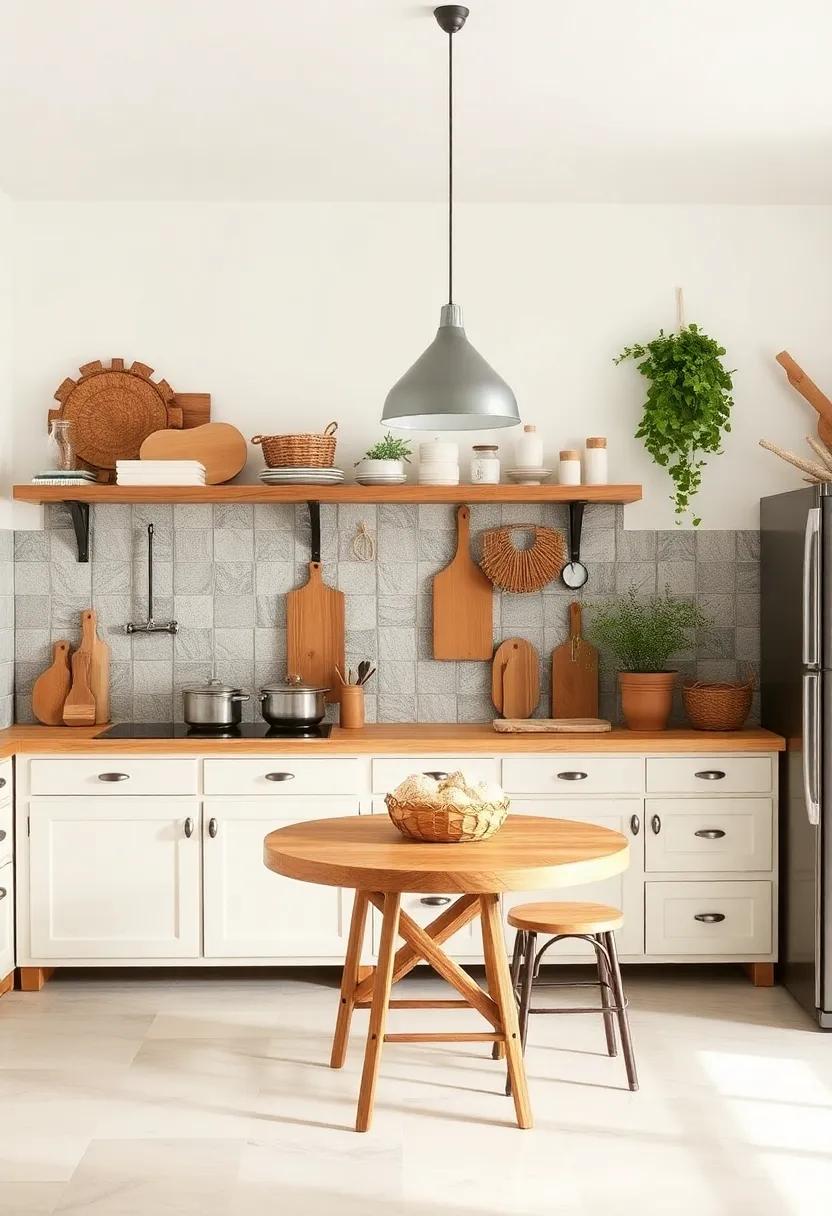
Transforming your kitchen into a rustic haven can be achieved effortlessly with handmade decor and accessories that infuse your space with character and warmth. Consider incorporating locally sourced wooden utensils, ceramic dishes, and handwoven baskets that add texture and functionality. Each piece should not only serve a purpose but tell a story—whether it’s a cutting board crafted from reclaimed wood or a set of handmade pottery that captures the eye. These elements work harmoniously to create a cohesive aesthetic that resonates with both tradition and personal expression.
To enhance your kitchen’s rustic charm, focus on accentuating natural materials and artisanal craftsmanship. Here are some ideas to guide your decor selection:
- Vintage glass jars for storage.
- Handmade table runners using burlap or linen.
- Embroidered dish towels showcasing local crafts.
- Copper pots and pans that shine with history.
Additionally, consider these eye-catching pieces that can effortlessly elevate your kitchen’s atmosphere:
| Item | Purpose |
|---|---|
| Hand-Turned Wooden Bowl | For serving or displaying fruits. |
| Woven Wall Hanging | Adds texture and artistic flair. |
| Rustic Shelving | Showcases cookware or collectibles. |
Embracing handmade pieces not only contributes to a unique aesthetic but also supports artisans and small businesses. Explore platforms like Etsy for one-of-a-kind decorations that resonate with your personal style while enhancing the overall charm of your kitchen.
Utilizing Heritage Elements to Tell a Story in Your Kitchen Design
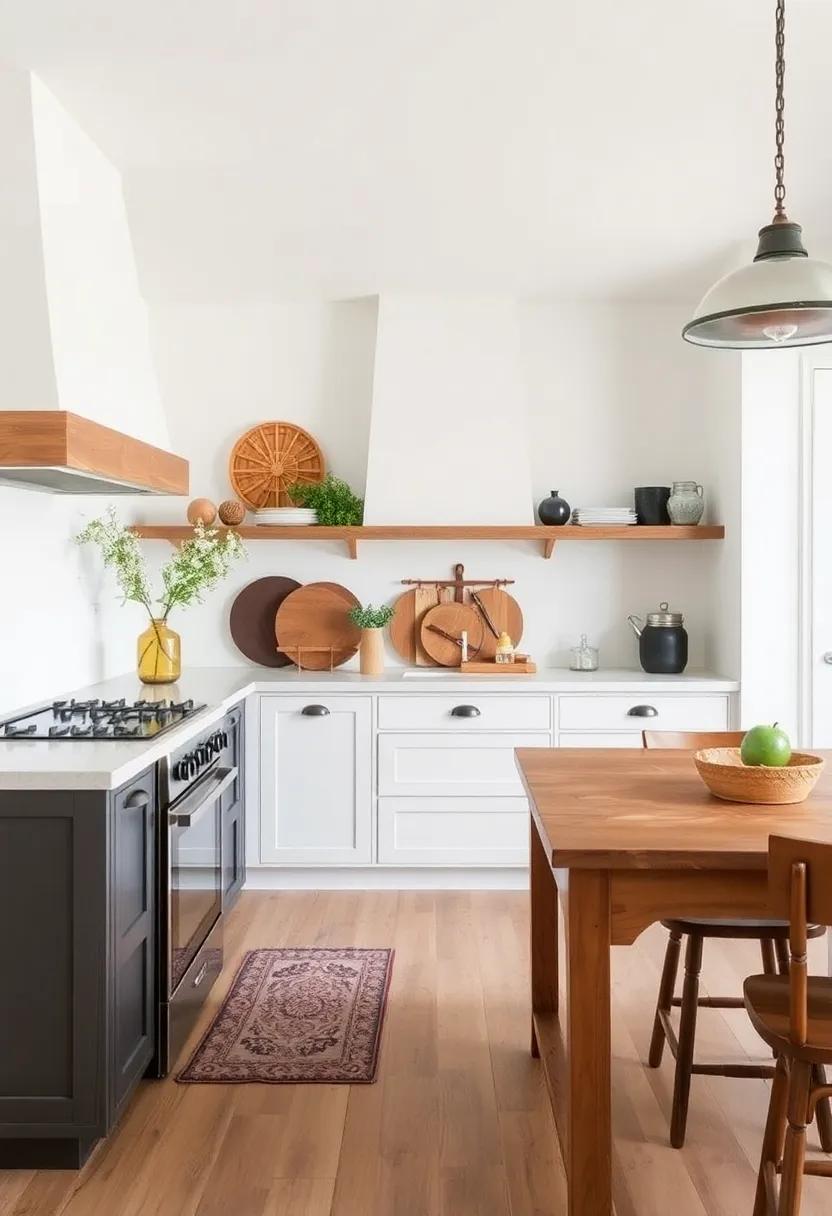
Incorporating heritage elements into kitchen design is a beautiful way to evoke stories of the past while creating a warm, inviting atmosphere. Elements like reclaimed wood beams, antique cabinets, and vintage fixtures can serve as focal points, offering a sense of nostalgia and authenticity. You might consider incorporating:
- Rustic dining tables made from salvaged materials that tell tales of family gatherings.
- Open shelving displaying heirloom dishes and glassware, making every meal an possibility to share memories.
- Textiles with traditional patterns, adding color and the comfort of old-world charm.
Additionally, integrating handcrafted tiles or stone countertops can enhance the story your kitchen tells, bridging the gap between functionality and artistry. Each selection can reflect cultural heritage, transforming everyday spaces into cultural landmarks. Consider a palette that suits your story, blending warm tones of earth and wood with pops of color from local artisanal pottery. For inspiration, explore resources that focus on artisanal design, like Houzz, where you can find unique ideas and community feedback on heritage-inspired kitchen revamps.
| Element | Story Angle |
|---|---|
| Reclaimed Wood | Tales of growth and renewal |
| Antique Fixtures | Echoes of historic craftsmanship |
| Handcrafted Pottery | Cultural connections and traditions |
Setting Up a Warm and Welcoming Dining Area within a Rustic Kitchen
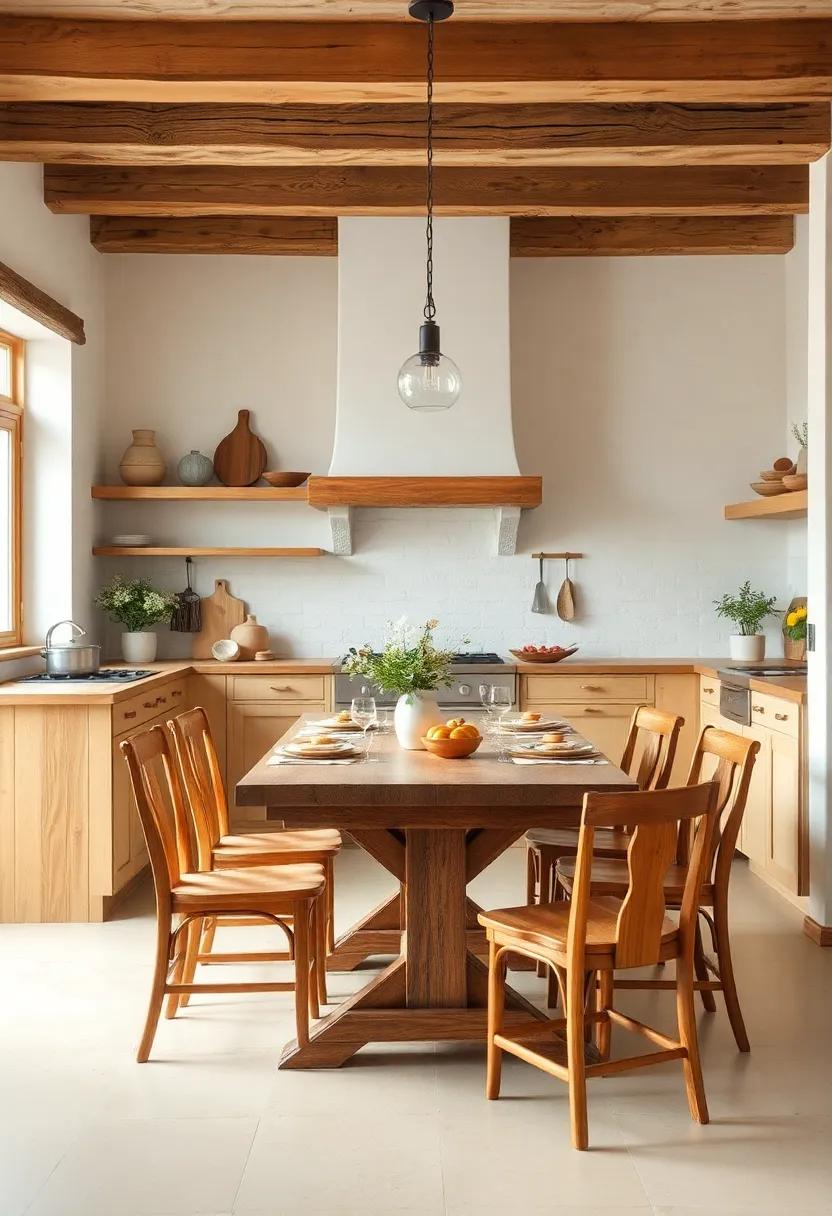
To create a dining area that exudes warmth and invites laughter and conversation, focus on incorporating natural materials that echo the rustic theme of your kitchen. Begin with a solid wood dining table, preferably in a rich, warm hue, to serve as the centerpiece. Pair this with mismatched chairs or benches that have a handcrafted feel. Textiles can also play a significant role; consider table runners made from burlap or linen, and plush cushions in earthy colors for added comfort. Don’t forget to introduce elements like wildflower centerpieces or rustic candle holders made from reclaimed wood to enhance the charm.
Lighting can dramatically transform your dining area. Install a vintage chandelier or pendant light that conveys a sense of nostalgia, and supplement it with soft, warm-toned table lamps or string lights draping across the ceiling to create a cozy ambience. To complete the look, decorate the walls with family photos in wooden frames or a gallery of rustic art. Embrace imperfections and let the space tell a story; after all, a welcoming dining area is all about fostering connections.For more ideas on creating a rustic vibe, visit houzz.
Blending Modern Convenience with Rustic Design for a Functional Space
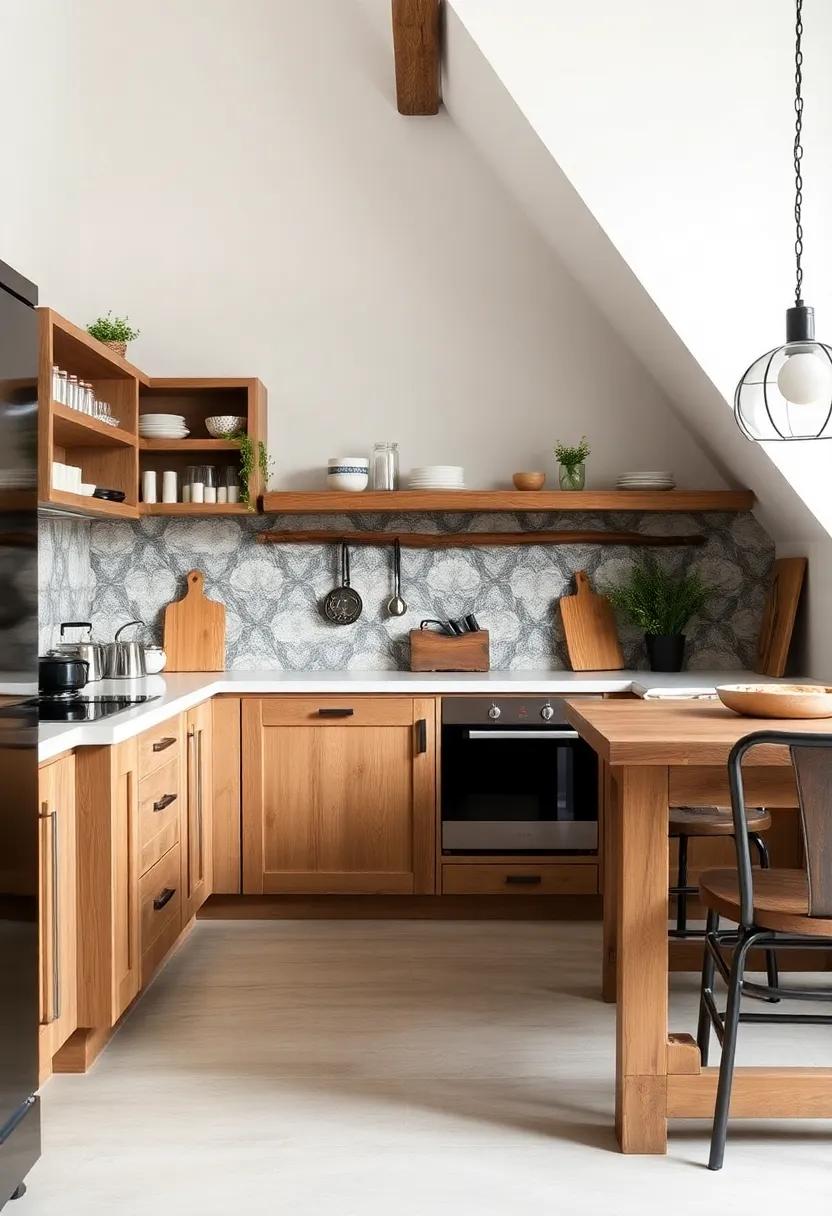
In the world of kitchen design,blending modern functionality with rustic aesthetics creates a harmonious environment that elevates both style and utility. Incorporating contemporary appliances into rustic cabinetry can breathe new life into your cooking space while retaining its traditional charm. Imagine warm wood accents juxtaposed with sleek stainless steel, where every cooking tool is easily accessible yet seamlessly integrated into the overall design.Key elements to achieve this balance include:
- Open Shelving: Displaying rustic dishware alongside modern gadgets.
- Subtle Color Palettes: Using earth tones merged with minimalist hues.
- Natural Materials: Combining reclaimed wood with engineered stone countertops.
To further enhance the ambiance, consider incorporating lighting fixtures that bridge the gap between both styles. Pendant lights with a weathered finish can marry vintage flair with modern illumination techniques, fostering a warm glow that invites activity. Additionally, utilizing a mix of textures—from smooth marble to rough-hewn wood—enhances sensory depth. Below is a simple table highlighting the must-have elements for your kitchen renovation:
| Element | Modern Touch | Rustic Influence |
|---|---|---|
| Cabinetry | Sleek,high-gloss finishes | Reclaimed wood with visible knots |
| Appliances | Stainless steel,energy-efficient | Vintage-style ranges and hoods |
| Countertops | Engineered stone or quartz | poured concrete or butcher block |
This fusion not only maximizes the kitchen’s usability but also creates an inviting space that reflects personal style. For more inspiration on rustic designs, check out Houzz.
Strategically Placing Indoor Plants to Enhance Your rustic Kitchen
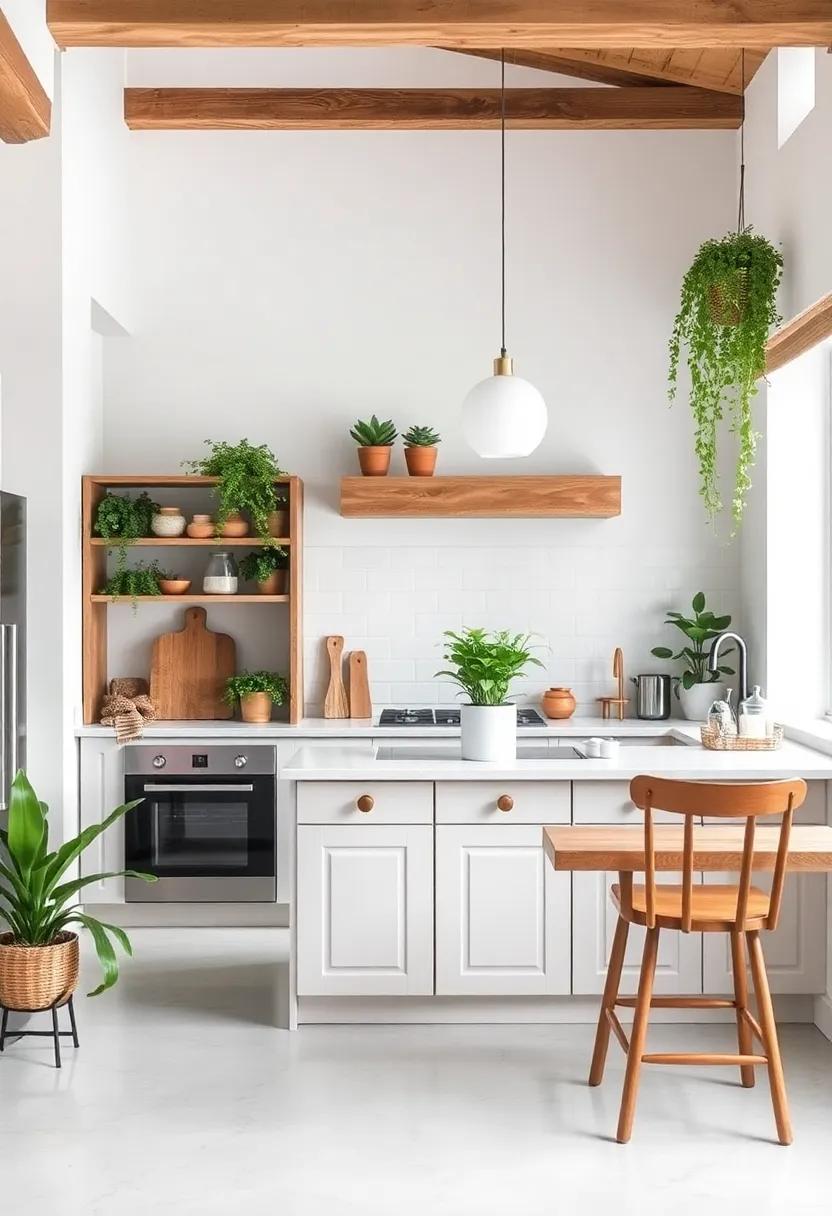
To fully embrace the rustic charm of your kitchen, thoughtfully incorporating indoor plants can create a harmonious balance between nature and your culinary space. Herbs, for instance, not only enhance the aesthetics but also add a delightful fragrance and flavor to your cooking. Consider placing a few small pots of basil, thyme, or rosemary on your windowsill, where they can bask in the sunlight while doubling as easy-to-reach ingredients. Hanging planters are another excellent way to introduce greenery; they can add vertical interest and draw the eye upward,enhancing the visual appeal of wooden beams or rustic shelves.
For a more dramatic effect, utilize larger indoor plants such as fiddle leaf figs or snake plants in the corners of your kitchen. These species thrive in various light conditions and contribute to the cozy atmosphere. When arranging your plants, consider grouping them in odd numbers to create visual interest. additionally, pairing plants of different heights and textures will foster depth and elegance in your space. To easily maintain consistency, select planters that complement your kitchen’s materials, such as terracotta or reclaimed wood, enhancing the rustic vibe while ensuring your green friends thrive for years to come.
Creating Seamless Transitions from Kitchen to Dining in Rustic Style
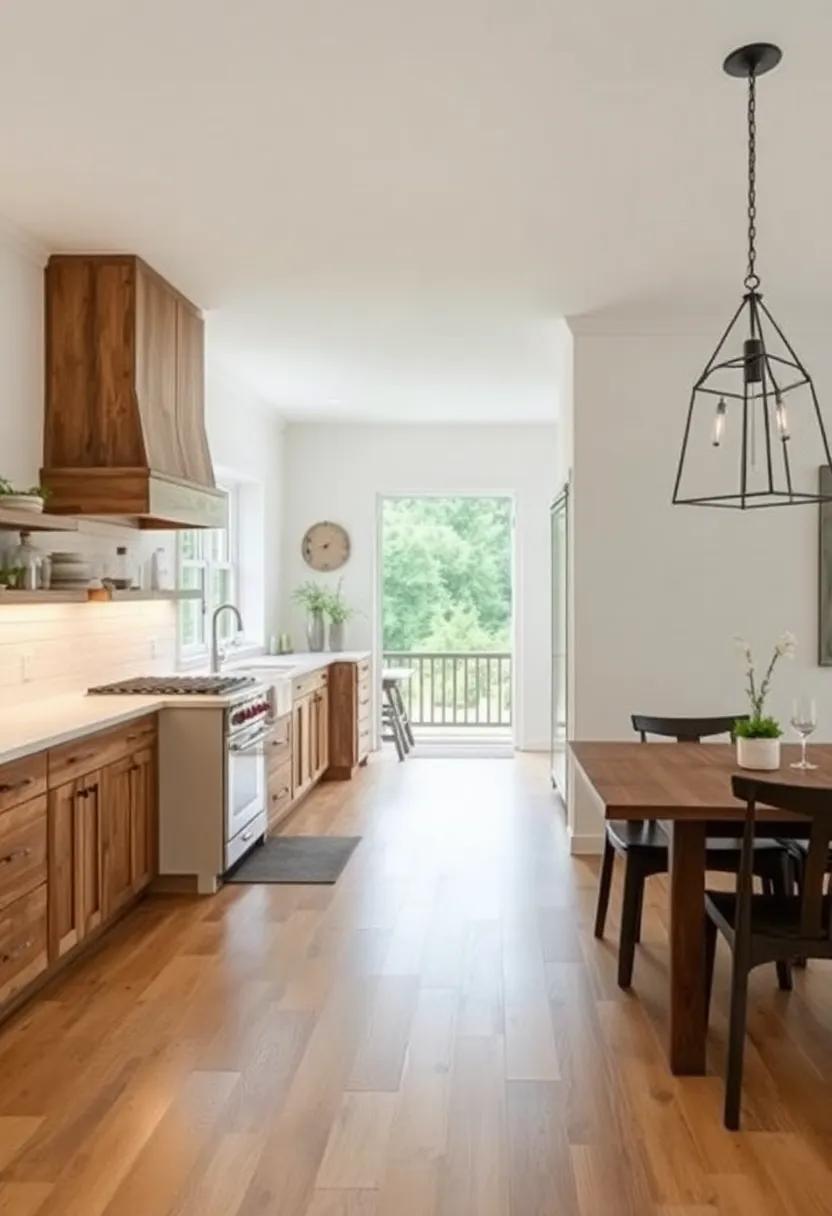
In a rustic design, creating a cohesive flow from your kitchen to the dining area can be achieved through intentional choices in color, materials, and decor. Employing a warm color palette that features earthy tones such as terracotta, olive green, and muted browns sets a cozy, inviting atmosphere. Consider incorporating natural materials—like reclaimed wood countertops and stone accents—that echo the charm of a countryside retreat. Open shelving can serve as an effective transitional piece, allowing for the display of vintage dishware or rustic decor, uniting both spaces in functionality and style.
Another key element in forging seamless transitions involves layered lighting. A combination of pendant lights over the kitchen island, wall sconces in the dining area, and candle accents creates a warm and inviting ambiance that encourages gatherings. To enhance the rustic ethos, use textiles that complement the overall aesthetic—think linen table runners or plaid throw pillows for seating. Incorporating greenery through indoor plants or herb pots can also breathe life into the space, blurring the lines between cooking and dining in a beautifully cohesive manner. For more inspiration, check out rusticartistry.com.
using Color Psychology to Create a Serene Rustic Kitchen Atmosphere
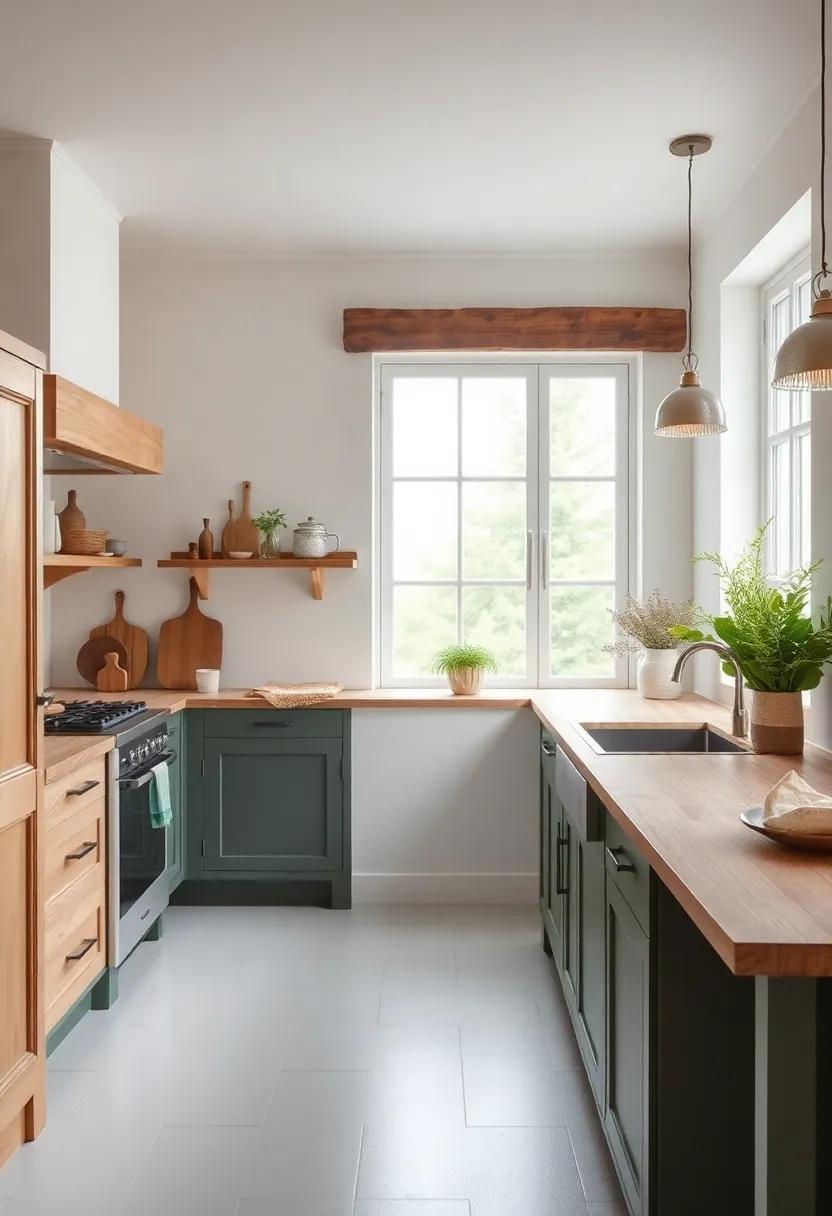
Color psychology plays a pivotal role in establishing a tranquil environment in rustic kitchens. By selecting hues that evoke nature, warmth, and comfort, you can effortlessly create a serene space that invites relaxation. Earthy tones like soft greens, muted browns, and warm taupes resonate with rustic aesthetics and mimic the calming elements found in nature. Incorporating pops of burnt orange or deep red as accents can inspire feelings of warmth and coziness, drawing family and friends into a comforting gathering spot. Moreover, the right shades can greatly influence mood, making it essential to choose your palette wisely for a harmonious effect.
To further enhance the serene vibe,consider using finishes and textures that complement your chosen colors. Matte and satin finishes on cabinets or walls allow for a subtle softness that doesn’t overwhelm the senses. These finishes work beautifully with natural materials like wood and stone, reinforcing the rustic theme.Add a touch of whimsy with decorative elements in pastel shades, or introduce herbal greens through potted plants that breathe life into the space. As you design your kitchen, remember that creating a sanctuary involves thoughtful color choices and a balance between vibrant hues and calming shades, all while keeping in line with the inviting charm of rustic design. For more insights on color psychology, you can visit ColorPsychology.org.
Incorporating Family Heirlooms into Your Rustic Kitchen Design
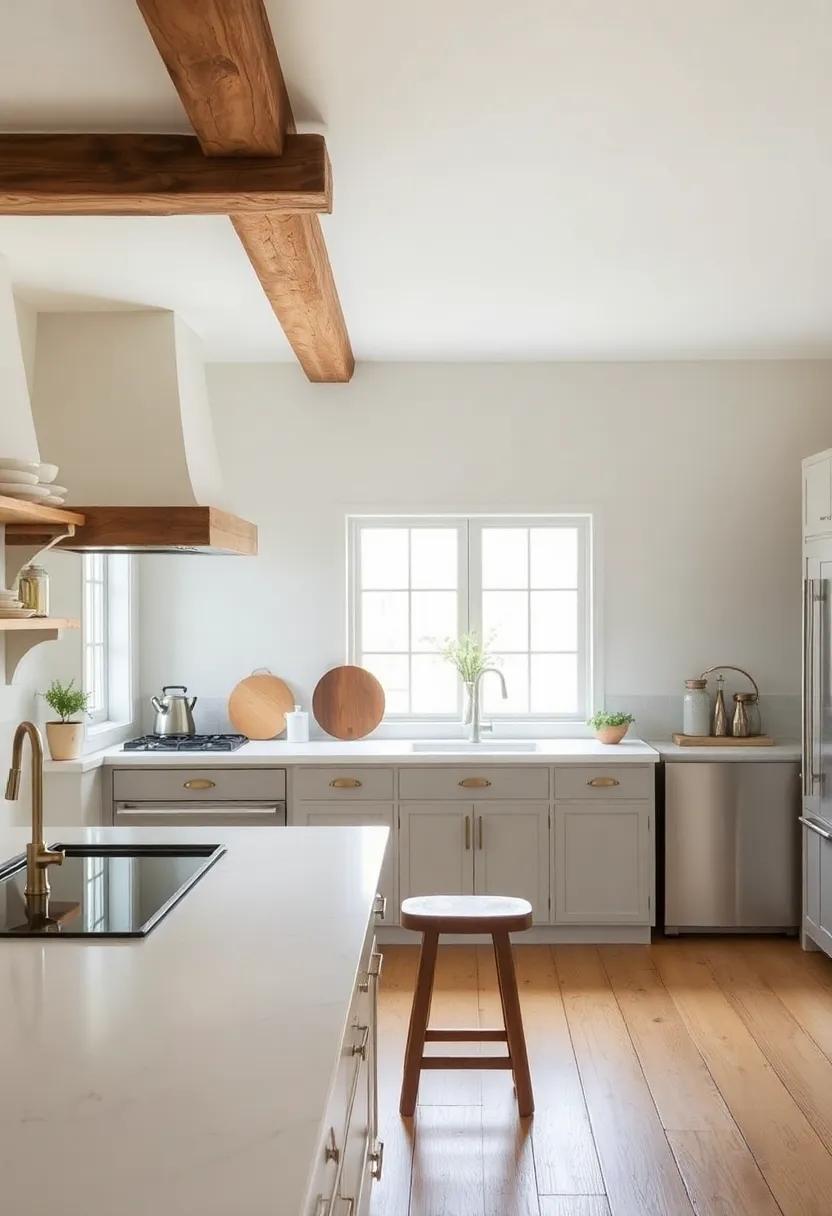
Integrating family heirlooms into your rustic kitchen design not only serves as a nod to tradition but also creates a warm, inviting atmosphere that is both personal and charming. Imagine displaying a vintage wooden bowl passed down through generations, contributing to a sense of nostalgia while serving as a functional centerpiece. Other heirlooms to consider include:
- Antique cookware: Cast iron skillets or copper pots can add an elegant touch.
- Handcrafted furniture: A farmhouse table or rustic chairs can become the heart of your kitchen.
- Decorative plates: Hanging family china can serve as art while reminding you of cherished meals.
To enhance the rustic charm further, don’t shy away from mixing textures and materials. A worn wooden countertop can complement shiny heirloom utensils, creating depth and interest. Consider also creating a display nook where you can showcase these treasured items together. Adorning shelves with heirloom jars, old cookbooks, and family photo frames can transform simple storage into a gallery of memories. For inspiration on how to incorporate heirlooms seamlessly into your design, visit House Beautiful for creative ideas that embrace both style and sentiment.
Crafting a Cozy Nook for Relaxation and Gathering in a Rustic Kitchen
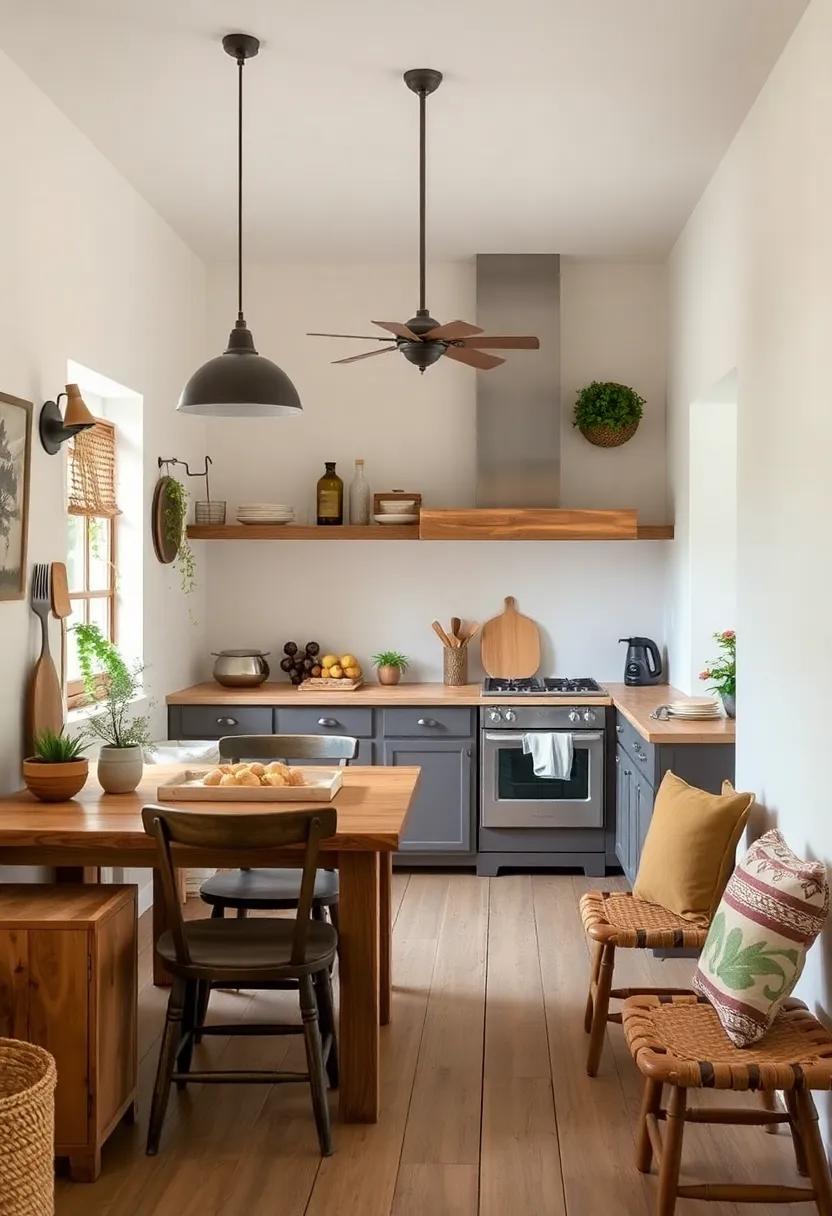
Transforming a corner of your rustic kitchen into a cozy nook invites warmth and connection. Picture plump cushions in earthy tones accentuating a reclaimed wood bench, paired with vintage-style tables that beckon for gatherings over steaming cups of coffee.Natural lighting spills in through charmingly imperfect windows, illuminating the space and highlighting handmade pottery and carefully curated decor. To enhance the area’s appeal, consider integrating elements such as:
- Woven Textiles: Add rich textures with throws and pillows that provide comfort and style.
- Layered Lighting: Incorporate a combination of ambient and task lighting—think wrought iron fixtures and soft-glow candles.
- Personal Touches: Display cherished family photos or heirloom dishes to create a sense of belonging.
Each nook can also serve practical purposes while maintaining its inviting charm. A small bookshelf filled with cookbooks invites culinary exploration,while a rolling cart can double as a mobile refreshment station for those cozy gatherings. Adding a rustic touch with a touch of greenery can make a difference; consider low-maintenance plants such as herbs in terracotta pots. Below is a simple guide to plant options ideal for a rustic kitchen nook:
| Plant | Care Level | Benefits |
|---|---|---|
| Basil | Easy | Fresh aroma, culinary uses |
| Rosemary | Low | Good for cooking, pest-repellent |
| Mint | Easy | Refreshing scent, versatile |
Exploring Layout Ideas that Maximize space and Charm in Rustic Kitchens
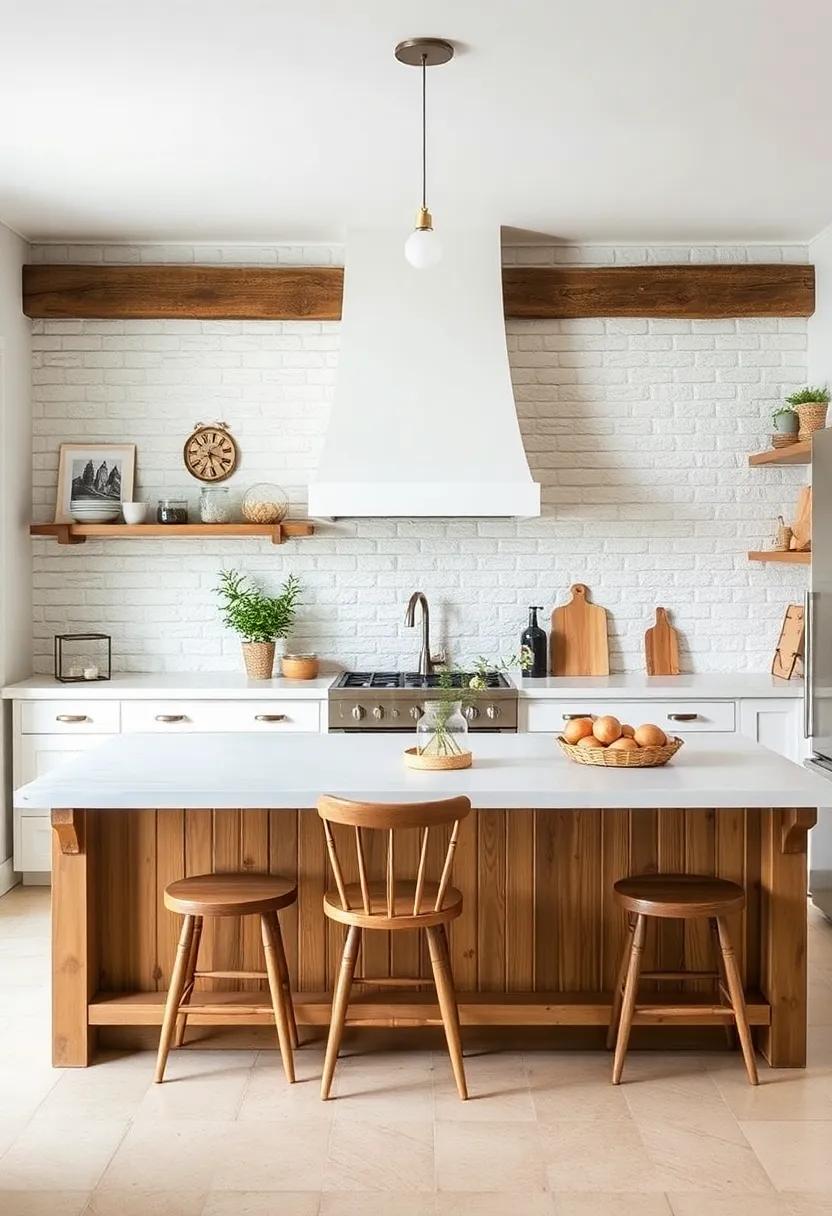
When designing a rustic kitchen, thoughtful layout choices can transform the space into a harmonious blend of functionality and charm. One effective approach is to incorporate a U-shaped layout, which not only maximizes counter space but also encapsulates the cook within a warm cocoon of wooden cabinetry and vintage accents. additionally, consider the open shelving trend that allows easy access to frequently used items while proudly displaying charming dishware or handmade ceramics that reflect the rustic theme. A central island can also serve as a communal hub for family and friends, enhancing the kitchen’s inviting atmosphere.
For a touch of uniqueness, think about adding a farmhouse table in the kitchen or a breakfast nook with a cozy bench. These elements encourage gatherings and create a sense of comfort. Opting for natural materials,such as reclaimed wood and stone countertops,will further enhance the rustic appeal while providing durability. To streamline your design choices, use a simple comparison table to weigh layout options:
| Layout Style | Pros | Cons |
| U-shaped | Maximizes space, great workflow | can feel enclosed |
| Galley | Efficient for small spaces | Lacks social interaction space |
| Open Plan | Encourages family interaction | Can be noisy, requires good association |
By taking these layout ideas into account, you can craft a rustic kitchen that not only captivates the eye but also fosters warmth and functionality. For more inspiration and tips, you may want to explore Houzz for rustic kitchen design ideas that perfectly combine space and appeal.
Captivating Wall treatments that Add Depth to Rustic Kitchen Designs
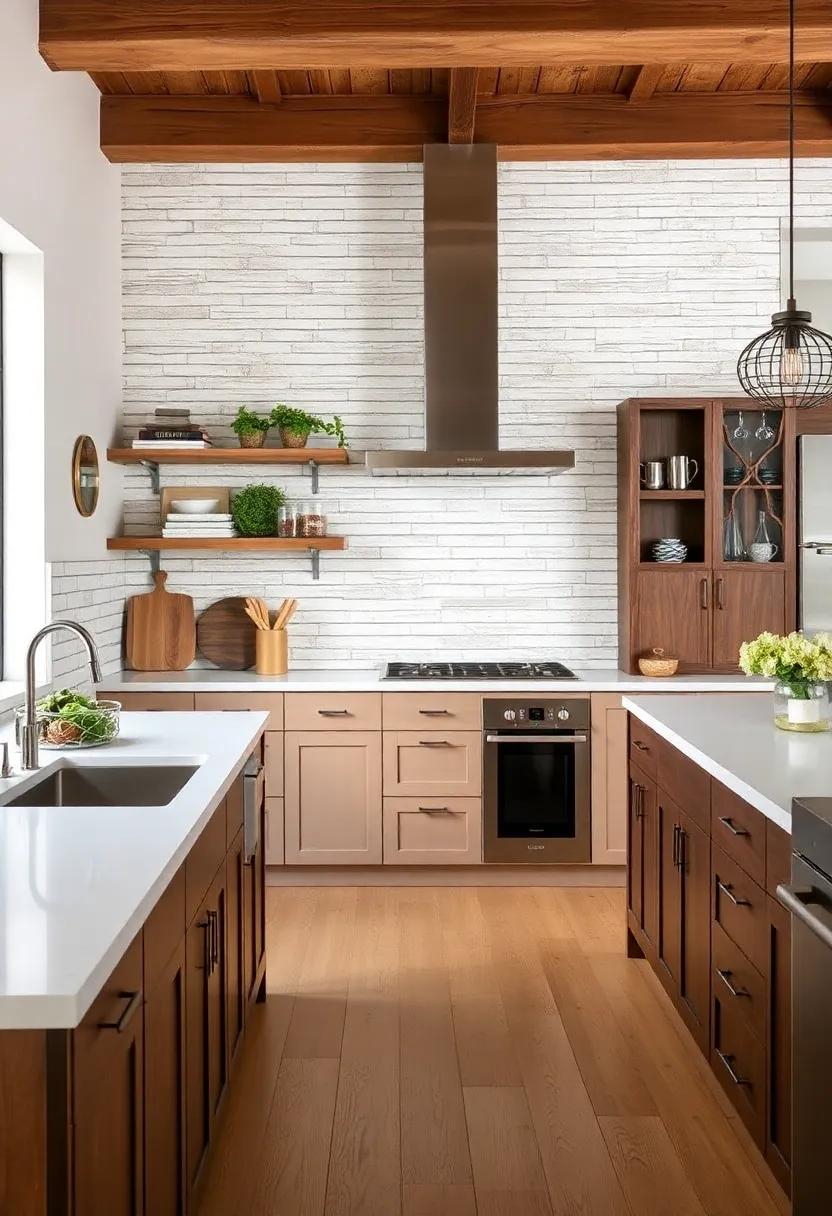
To elevate the charm of rustic kitchen designs, consider incorporating captivating wall treatments that create a sense of depth and intrigue. One of the most beloved options is shiplap,which brings a touch of coastal warmth and texture. When painted in soft, muted hues, it complements wooden beams and stone accents, providing a cohesive aesthetic. Another excellent choice is reclaimed wood paneling; not only does it add character and history to the space, but it also serves as a stunning backdrop for open shelving or decorative plates. Brick accents can introduce an urban touch, offering a blend of rustic and modern styles that enhances the overall design without overpowering it.
For those looking to innovate further, consider exploring textured wallpapers that mimic natural materials like linen or burlap. These options create a tactile experience while maintaining the rustic allure. Alternatively, metallic finishes on accent walls can introduce a contemporary twist, reflecting light and adding a subtle shimmer that pairs beautifully with natural wood and stone. Here’s a quick comparison of popular wall treatment options:
| Wall Treatment | Texture | Color Options | Style Compatibility |
|---|---|---|---|
| Shiplap | Smooth | Pastels, Whites | Classic, Farmhouse |
| Reclaimed Wood | Rough | Natural Browns | Rustic, Vintage |
| Textured Wallpaper | Soft | Neutral Tones | Traditional, Eclectic |
| Brick | Rough | Red, Gray | Urban, Industrial |
Each of these treatments offers a unique way to enhance your kitchen’s ambiance, creating an inviting space that resonates with warmth and character. For more inspiration on rustic designs and wall treatments, visit Houzz.
The art of Mixing Styles: How to Complement Rustic with Modern Influences
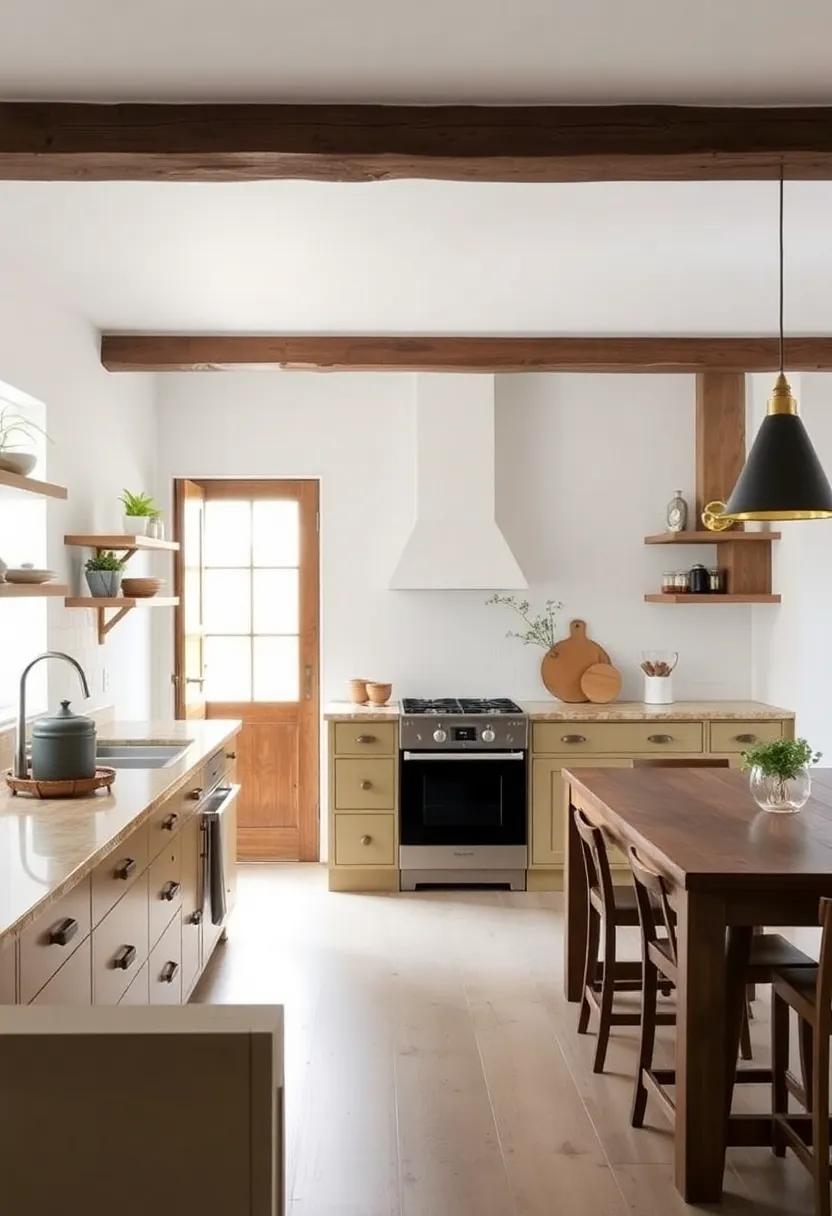
Combining rustic charm with sleek modern influences creates a unique aesthetic that resonates with warmth and functionality. Think of wooden beams contrasted against a minimalist metal light fixture,or a reclaimed wood dining table paired with contemporary chairs.This style speaks not only to the senses but also to the soul, capturing a sense of nostalgia while embracing the fresh and functional approach of modern design. Consider incorporating elements like:
- Natural Textures: Use materials such as stone or wood for countertops and backsplashes.
- Simplistic Lines: Choose cabinetry with clean lines, avoiding overly ornate designs.
- accent Lighting: Install modern pendant lights that pop against rustic decor.
To enhance the cohesive blend of these styles, pay attention to your color palette.Warm,earthy tones can create a welcoming ambiance,while crisp whites and cool greys can offer a clean contrast. Opt for a soft color scheme adorned with metallic finishes to bridge the rustic and modern divide.Use textiles that blend both worlds, such as a chic linen table runner alongside a cozy, chunky knit throw. Below is a comparison table showcasing ways to merge rustic and modern influences:
| Rustic Element | Modern influence |
|---|---|
| Reclaimed Wood | Sleek Metal Fixtures |
| Vintage Accessories | Minimalist Decor |
| Rustic Stone Walls | Geometric Patterns |
For more inspiration on blending styles in your kitchen, visit Houzz.
Future Outlook
As we bid farewell to our exploration of rustic kitchen designs,we find ourselves enveloped in the warmth and charm that these spaces evoke. Each handcrafted detail, from the weathered wood beams to the intimate glow of vintage lighting, invites not just functionality but also a heartfelt connection to nature and tradition.It’s clear that a rustic kitchen is more than just a cooking space; it’s a nurturing haven where meals become memories and gatherings flourish.So whether you’re inspired to redesign your own kitchen or simply savor the beauty of these spaces, remember that it’s the authenticity and warmth that truly make a kitchen feel like home. Embrace the allure of rustic design, and let it infuse your culinary adventures with a touch of timeless elegance.
As an Amazon Associate I earn from qualifying purchases.

